Why a break-up looks increasingly likely for BP

One would imagine that BP has had enough of Bernard Looney’s clumsy metaphors. But if it was a “cash machine” before Russia’s invasion of Ukraine, to borrow Looney’s unfortunate words, then how might the Irishman characterise his employer on current form – “a money-printing service to rival the Royal Mint” perhaps?
It probably doesn’t matter. Critics have been handed more ammunition than ever to lay into the company without Looney putting his foot in it again. Surging oil and gas prices on the back of Vladimir Putin’s war have not so much boosted profits at BP as sent them through the roof, provoking perhaps the fiercest anti-oil backlash yet with detractors queueing up to outdo each other in the outrage stakes.
BP is “mining gold out of vast suffering”, Greenpeace UK’s head of climate justice, Kate Blagojevic, said after the FTSE 100 company announced record results for last year.
Profits of $28bn (£23bn) were more than double what they were in 2021 – proof that BP is “laughing all the way to the bank”, the Trades Union Congress said. The shadow climate secretary Ed Miliband declared that “the windfalls of war” were “coming out of the pockets of the British people”.
Meanwhile, BP continues to walk a tightrope between keeping shareholders onside with lavish payouts and reining in oil exploration to satisfy environmentalists, at the same time as pushing further and faster into green projects.

This is where the debate about Big Oil remains focused: can BP, Shell and rivals juggle widely conflicting interests as the world charges towards decarbonisation? Increasingly the answer to that question appears to be no – in order to keep one side happy, it almost inevitably means that the other is left feeling short-changed.
For BP to truly ramp up investment in clean energy, it requires that investors accept smaller payouts from a company that has long prided itself as one of the most reliable and generous dividend-payers in corporate Britain as BP places bigger bets on riskier, early-stage projects, and vice versa.
Perhaps then it is time to ask a more fundamental question altogether, which is whether the oil and gas giants of old are actually capable of being trailblazers for renewable technology at all. Looney’s argument is that BP’s heritage, engineering nous, and position as a gas, power and carbon trader, will enable it to do this while continuing to post oil-like returns on capital of between 8 and 10pc.
But it’s a thesis that remains largely aspirational and untested, not least because BP has yet to direct meaningful levels of capital towards clean energy initiatives, a situation that seems unlikely to change any time soon.
As pressure builds on the industry to cut emissions and switch to cleaner energy, fossil fuel exploration is more lucrative than it has been for a long time, which means even greater rewards for investors – in this instance a 10pc increase in the dividend and an extra $2.75bn of buybacks, taking total shareholder returns for 2022 to nearly $14.4bn.

The upshot is that BP has already begun rowing back on its climate commitments. Whereas before the aim was to cut emissions by 35pc to 40pc by the end of this decade, it is now targeting a figure of around 20pc to 30pc. For a business with BP’s carbon footprint, that is a pretty significant retreat.
Yet the issue isn’t just that BP is a reluctant champion of renewables, or that traditional shareholders lack the incentive to encourage its adoption of green energy. A bigger question is this. How realistic is it, really, to think that an outfit that has spent the last century drilling relentlessly for hydrocarbons in every corner of the planet can completely reinvent itself as a business that builds and operates wind turbines, solar farms, and electric car charging points?
The reality is that BP and Shell are being asked to focus on new technologies that are as alien to them as the combustion engine was to horse breeders.
Yet, nearly 140 years after Carl Benz filed a patent for what is regarded as the world’s first motor car, if you had to lay a bet on who will become the pre-eminent electric vehicle producer of the 21st century, would it be: an unencumbered technology company like Tesla, with a visionary like Elon Musk leading the charge; or one of the other traditional car manufacturers such as Volkswagen – an organisation so wedded to diesel and petrol that it has been forced to fork out more than €30bn in fines for trying to make its cars seem less pollutive than they are.
Size and longevity are not necessarily any guarantee of survival when it comes to massive technological change. If they were, Kodak would still be around. Ditto Blockbuster, or Pan-Am airlines.
With Europe’s fossil fuel champions under greater political and social pressure than their American counterparts to embrace a low-carbon future, it is telling that their share prices have diverged. Total shareholder returns for BP and Shell are roughly half those of Exxon and Chevron over the last 12 months alone.
Looney has alternative options: a break-up that creates two distinct companies with different growth prospects, risk profiles, returns, and more aligned investors in each; or a complete wind-down in which BP continues pumping oil and gas out of the ground and returns all its excess profits to institutional shareholders, who can then direct the capital towards a new generation of genuine renewable energy companies that aren't constrained by an emotional and financial attachment to the past.
A company man like Looney will be reluctant to oversee such a radical shake-up but with BP struggling to navigate such diametrically opposed interests, maybe it is time to consider a plan B and admit that it isn't easy being green. In fact, for a major oil business, it is impossible.

 money
money 